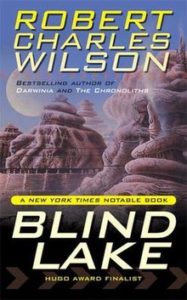 This 400-page “first contact” story has some interesting ideas that make it worthwhile, but it is a very slow read for lack of editing. I found myself skimming pages of useless narrative, usually irrelevant backstory about characters’ childhoods – who cares? Likewise, most of the dialog was mere chit-chat that furthered nothing. I guess many readers are reassured by such familiar filler (the novel is a Hugo award-winner), but I’m not one of them. Getting through this tome was a slog for me.
This 400-page “first contact” story has some interesting ideas that make it worthwhile, but it is a very slow read for lack of editing. I found myself skimming pages of useless narrative, usually irrelevant backstory about characters’ childhoods – who cares? Likewise, most of the dialog was mere chit-chat that furthered nothing. I guess many readers are reassured by such familiar filler (the novel is a Hugo award-winner), but I’m not one of them. Getting through this tome was a slog for me.
That annoyance aside, what was good about the novel? As a story, it had three strong points, or at least potential story points. One was the basic technology that enabled the first contact with an alien civilization. With considerable hand-waving and not much science, the author describes a whiz-bang telescope that sort of deconstructs the received signal and mathematically enhances it to let it self-organize in such a way that Earth observers can track the goings-on of the remote planet as if they were running a downtown CCTV. Notwithstanding the fifty-one light-year signal delay, it’s like the almost-real-time exploration we do with a Mars rover. I thought that was a neat idea and could have been exploited a lot more than it was. Turns out, the technology was never well-explained, and the observations it made available were indistinct, at best.
The second strong story element was a lockdown of the research town, “Blind Lake.” I have a soft spot for that kind of “quarantine” setup. People in the community cannot get out, and nobody can get in. Communications are blocked at the borders. Drone trucks bring in minimal food and medical supplies. The situation is reminiscent of The Truman Show. You try to leave and you’ll be shot dead by robo-guards. Nobody knows why, or what it means, or what the risk is, or how long it will last. It’s a good story setup for revealing characters.
Unfortunately, in this case, the quarantine situation is just sketched. Nothing is mentioned about how infrastructure works, such as electricity, fresh water, data storage and ISPs ; how supplies are maintained, such as gasoline, building materials, and dairy products; nothing about economics and politics. The quarantine is just a sketch in broad strokes and we never do learn who is responsible for it or exactly why – presumably it’s the ever-evil U.S. government. I could have used a lot more exploration of the quarantine dilemma, which is a great story trick, wasted here.
Finally, I sort of liked the character of a young girl, Tess, who is between eleven and fourteen, it was never clear, who seems to have an imaginary friend or hallucinated alter-ego called Mirror Girl. It’s a neat character idea and it makes Tess sort of clairvoyant at times, and maybe paranormal in other ways, such as by teleportation and maybe invisibility. It’s a great opportunity for a complex interiority. It does drift off into a fantasy element, as there is never any explanation of what or who Mirror Girl is, and in the end, it is not even clear what the purpose of that shadow character was. Maybe the kid was just nuts.
The alien was disappointingly anthropomorphic, bilaterally symmetrical, bipedal, two arms, two legs, one torso, its main distinctive features were a head like a horizontal disk and a breathing vent like “a diseased vagina” in its thorax. The alien (only one is closely observed) never does anything interesting, not even jumping jacks. It shuffles slowly around its apparently destitute planet, alone, for no purpose. It doesn’t communicate, except for the last few pages of the novel when it inexplicably becomes verbose, but still incomprehensible. What a wasted opportunity. The whole point of a first contact story is to explore the limits of human understanding and communication. Oh, well.
As for the human story, it was all cliché all the time. Abusive ex-husband bullies the ex-wife for custody of the daughter (why? – no clue). Hero colleague saves the day and wins over the child by telling her bedtime stories and moves in with the mom. Evil ex-husband jumps into a pit of fire in desperation (Why? No clue). None of the action is motivated, none of it matters, all of it is boring.
The ending is, predictably, uninteresting. Predictable because the story itself was wobbly throughout, and likely written without an outline, amounting to no more than one damn thing after another. The ending is a massive info-dump explaining in retrospect, “what really happened.”
Some good sci-fi-ish ideas appeared, as noted. Does the novel count as Psi-fi, an exploration of human consciousness? It could have been a first-rate classic. Unfortunately, in this case, the opportunity was squandered.
Wilson, Robert Charles (2003). Blind Lake. New York: Tor, 399 pages.